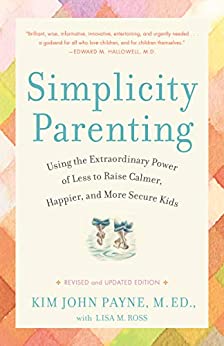More on this book
Community
Kindle Notes & Highlights
Read between
August 14 - September 20, 2018
So, short of getting rid of the television, I suggest moving it (and the home computer[s]) out of children’s bedrooms and communal rooms, and putting them into the parents’ bedroom or a den or family office. This helps families equate the “family room” with shared activities other than television. It makes a real and symbolic difference, moving the television from the center, to the margins of daily life.
Some families who limit television also report benefiting from intermittent television “holidays” of a week or a weekend. Such “breaks” help them simplify, and be more conscious of how much television they’re actually watching. It also helps them develop new leisure habits.
Fifty percent of parents polled said they worried “a lot” about someone kidnapping their child, with drugs and alcohol (55 percent) and negative messages in the media (39 percent) also ranking high on the list of worries.25 Have the threats to our children increased, compared to a generation or two ago? Have “negative social influences” grown, or is it the scope and influence of the media—in our homes and our lives—that has expanded dramatically? The lead story of any local news program—a missing child, a convicted child molester out of prison—will confirm that good news doesn’t sell.
Our media has become increasingly fear based. I think this is a huge problem, and the solution can't be to ignore it. But limiting it, sure.
Some parents want to be an open book to their children; they equate honesty with full disclosure.
Kids as young as kindergarten age are hearing, over juice and crackers, about shrinking rainforests and oil reserves. In their concern, and remarkable ability to drink in information, many very young kids hold a precocious awareness of huge issues. But is that helpful, to them or the environment?
Here’s another “mathematical equation” I’ve noticed in the parent-child dance of involvement. Very often, in two-parent households, when one parent is overinvolved in their child’s life, the other parent is underinvolved.


